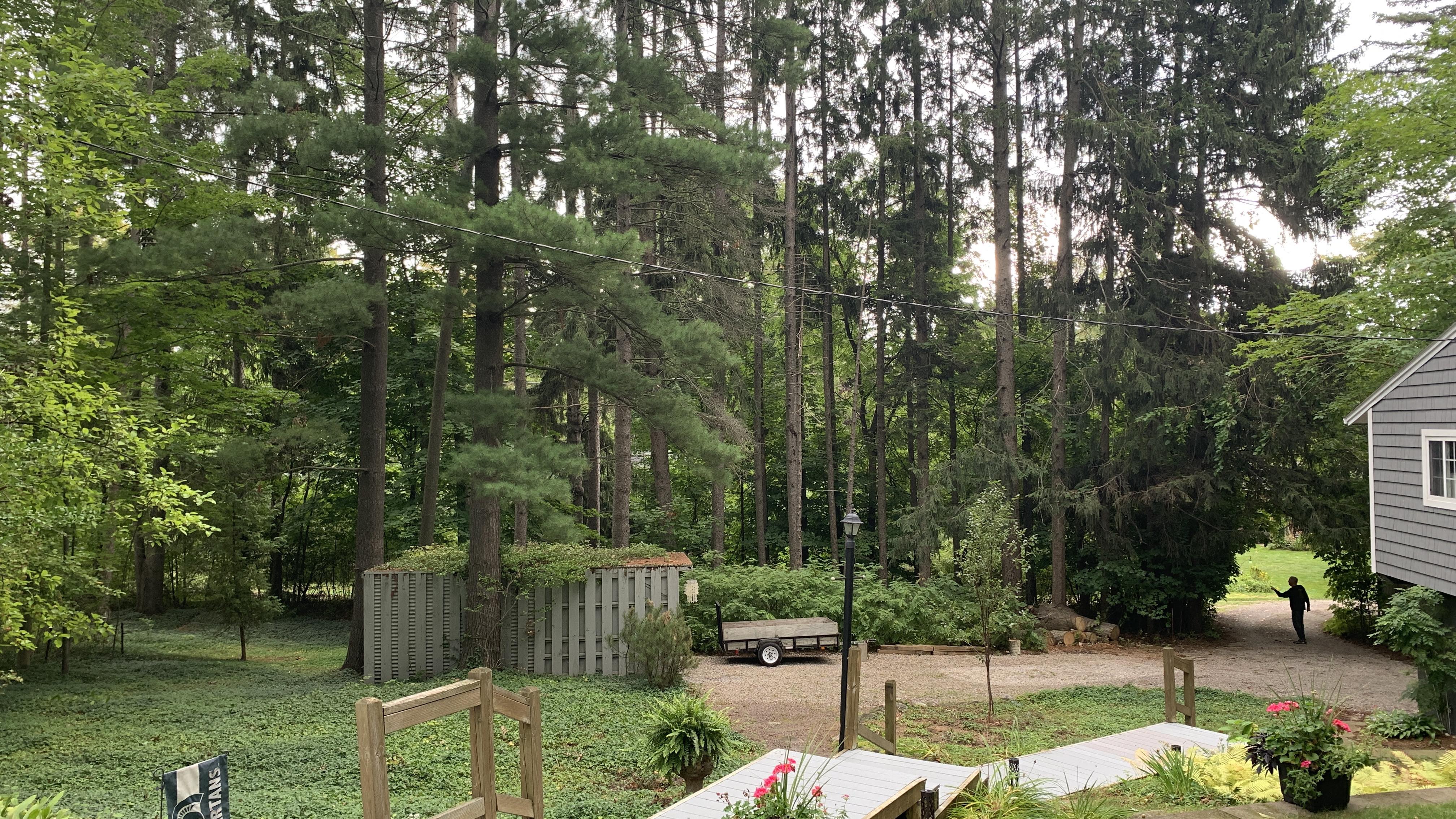
Local Homeowners Push Back Against Consumers Energy Over Tree Removals
By Craig Manning | Sept. 20, 2023
Hundreds of trees near the base of Old Mission Peninsula could come down as part of an aggressive new effort by Consumers Energy to reduce power outages. But affected homeowners say Consumers has behaved unprofessionally throughout that process, using threats of lawsuits and other bully tactics to intimidate property holders into signing their trees and large swaths of their land over to the utility. Now, a group of neighbors is banding together to push back, with the battle potentially bound for the courtroom.
Heather Shaw and her husband live on West Orchard Drive, one of several neighborhood streets at the base of Old Mission Peninsula that sits nestled in a forest of trees. Earlier this year, Shaw and many of her neighbors received “overnight packets of legal documents” from Consumers, asking them to “sign over easements [on our land].”
Homeowners in that area tell The Ticker the trouble with Consumers dates back about five years, to when the utility replaced a power line servicing the peninsula with a bigger, higher voltage line that cut through a slightly different path. At the time, Consumers grabbed slimmer 15-foot easements for the project. Now, the utility is back, and is seeking wider easements that local homeowners fear could transform the look and feel of their properties and neighborhoods
One affected couple is Larry and Mary Nykerk, whose home sits on the corner of Peninsula Drive and Eastern Avenue. Five years ago, Consumers built its new power line right through the Nykerks’ backyard (pictured). Now, the utility is trying to remove 61 trees from the lot, citing a “standard of best practice” being rolled out statewide.
That “best practice” is the “20/40/80 standard,” described in legal documents as a tool of easement rights “used for protecting and maintaining” electrical lines. Under the 20/40/80 standard, Consumers has the legal right to “restrict the construction of buildings and infrastructure and limit grading changes within 20 feet of the line”; to “clear any trees and brush within 40 feet of the line”; and to “trim, remove, and control any trees between 40 feet and 80 feet of the line which are 35 feet or taller.”
From conversations with Chris Smith, a senior right-of-way agent with Consumers Energy, the Nykerks learned the new standard is the result of a standoff between Michigan’s two major utilities – Consumers and DTE Energy – and the Michigan Public Service Commission (MPSC). Recently, the MPSC and the governor’s office have ramped up scrutiny on the utilities for frequent power outages around the state. According to Axios, “the average Michigan electricity customer experienced 14.6 hours of outages in 2021” – double the national average, and the sixth worst rate in the country.
In August 2021, when “more than 750,000 Michiganders lost power” and outages lasted “up to a week on some of the hottest days of the year,” Governor Gretchen Whitmer called on the utilities to “commit resources to improve reliability through tree trimming and grid hardening.” Then last fall, another streak of severe weather toppled thousands of power lines and left half a million Michigan customers without electricity, prompting the MPSC to order an audit of both Consumers and DTE, “to hold the state’s two largest electric utilities to account for persistent reliability and safety challenges.” And just weeks ago, the MPSC announced it would start imposing penalties on the utilities in the event of extended outages.
Consumers spokesperson Brian Wheeler confirmed in an email to The Ticker that clearing trees away from power lines is indeed part of the utility’s current efforts “to reduce the number and length of outages” in the Traverse City area, adding that the utility “definitely understand the impact that tree trimming has for homeowners” and wants to “work with them and community leaders to ensure we understand any concerns and make changes to our plans if we can.”
“So, they’re under big pressure to show what they’ve done [to increase power reliability],” says Mary Nykerk of the utilities. “And unfortunately, we are the victims of that lobbying.”
But while the Nykerks understand why Consumers is adopting a more aggressive approach to easement management, they’re also frustrated with the utility’s treatment of them and their neighbors. One sticking point? Compensation, which Consumers is legally obligated to negotiate with landowners in the event of private property takings such as these.
“This time around, they offered us $8,500,” Mary says. “Five years ago, when they first came through with this power line, we got $1,000 a tree. And if they think we’re going to take any less than $1,000 a tree this time around, then they’re mistaken.”
But asking for more money risks escalating the issue.
“A woman two doors down from us, she asked for $35,000, and they just kind of laughed at that,” Mary says. “They basically told her, ‘Fine, you’ve got until September 30 [to agree to our terms], and after that, we’ll give it to our lawyers, and then we’ll condemn your property and take it through eminent domain.’”
When asked what the specific Consumers policy is for compensating property owners for lost trees – and why that policy may have changed in the past five years – Wheeler said he didn’t know and would “have to check into that.”
For her part, Shaw is resigned to the idea that “we might not be able to do anything about Consumers Energy’s eminent domain rights,” but she’s rallying neighbors with the hopes of pushing the utility toward good faith negotiations and more transparency.
“What we’ve realized [from talking with our neighbors] is that everybody's getting a completely different message,” Shaw says. “Some people haven’t heard anything since May. Others are getting approached almost daily with threats of lawsuits if they don’t sign these easement extensions. Some homeowners have been told by Consumers not to talk to their neighbors about what's going on. So, it's kind of a campaign of chaos. I think Consumers’ whole strategy was to bully us and hope that we’d all sign because we'd be afraid if we don’t, we won’t get any money.”
Nick Perez, who owns a new under-construction house on Milliken, says most neighbors have agreed not to sign anything with Consumers until they’ve had a chance to present a united front.
“Consumers would clearly prefer that we weren’t all talking, but we’re just trying to protect our rights and our property values, and we want to know what they’re going to do to compensate us fairly and equally amongst everyone,” Perez says. “And I'm sure Consumers would like to avoid having this go to court – as would everyone else involved – but it may come to that.”
Comment






